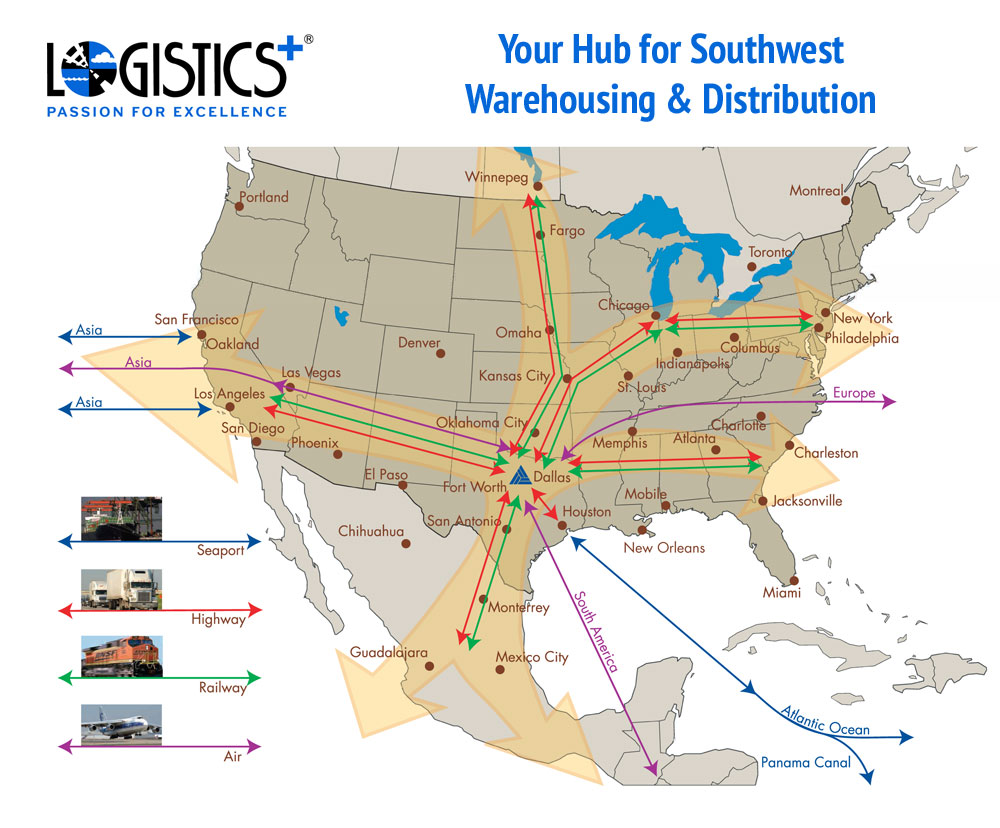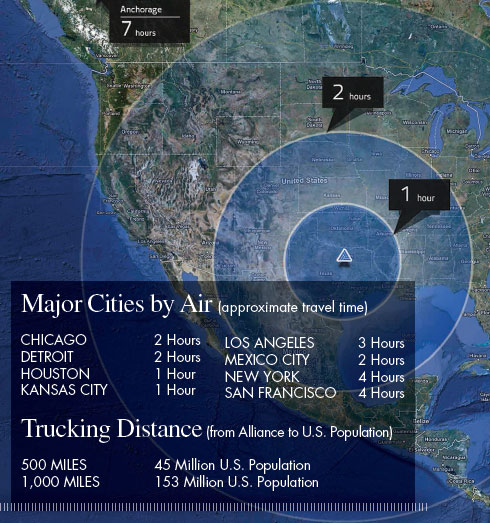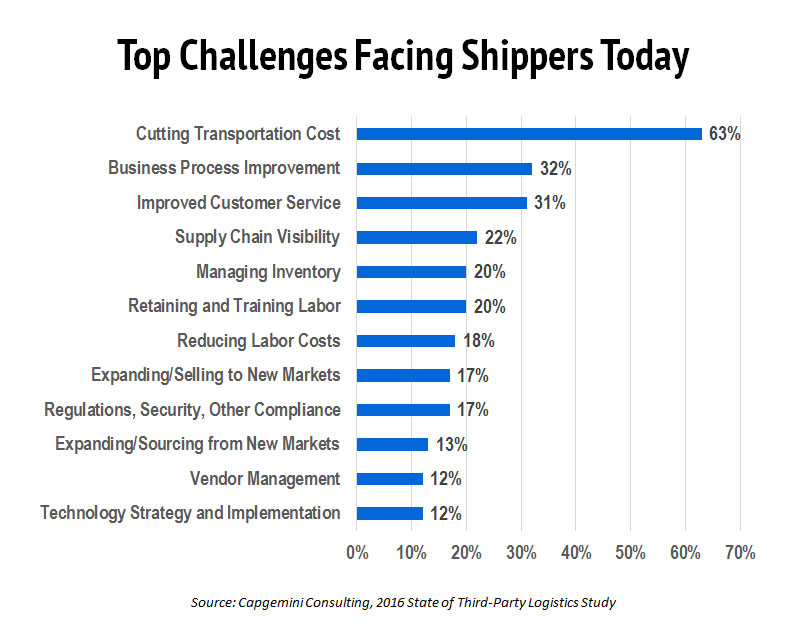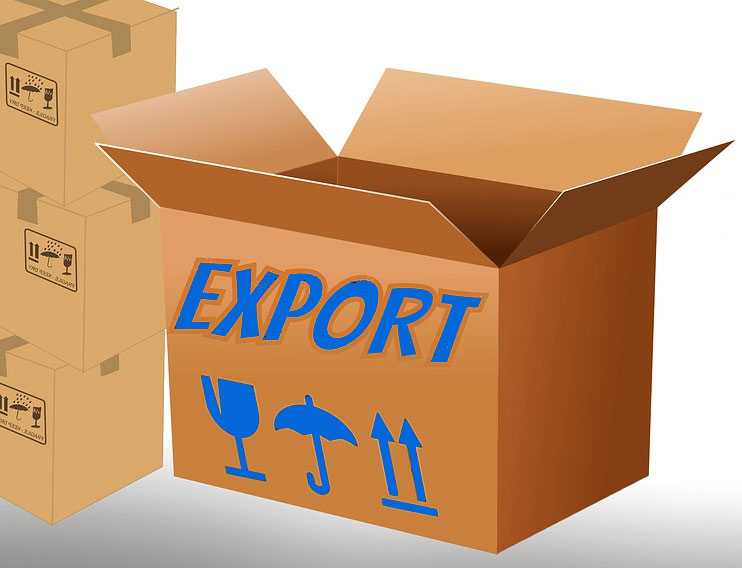
by logisticsplus | Aug 8, 2016 | News
 Centrally located in the fourth largest metro area in the United States, the Logistics Plus Dallas/Fort Worth, TX (DFW) warehouse provides 180,000 square feet of prime storage space. Additionally, the facility is located on the 18,000-acre AllianceTexas development which is anchored by the Alliance Global Logistics Hub – one of the world’s premier inland ports. The Logistics Plus Southwest location offers shippers a strategic multi-modal transportation hub, including:
Centrally located in the fourth largest metro area in the United States, the Logistics Plus Dallas/Fort Worth, TX (DFW) warehouse provides 180,000 square feet of prime storage space. Additionally, the facility is located on the 18,000-acre AllianceTexas development which is anchored by the Alliance Global Logistics Hub – one of the world’s premier inland ports. The Logistics Plus Southwest location offers shippers a strategic multi-modal transportation hub, including:
- Access to two Class 1 rail lines (BNSF and UP)
- Proximity to Fort Worth Alliance Airport – the world’s first industrial airport
 Connections to Highway 35W from Mexico to Canada; Texas Highways 114 and 170; and regional sorting hubs for both FedEx and UPS
Connections to Highway 35W from Mexico to Canada; Texas Highways 114 and 170; and regional sorting hubs for both FedEx and UPS- Fully activated general-purpose Foreign-Trade Zone (FTZ) space and services
- Triple Freeport Inventory Tax Exemption on goods that move in and out of Texas within a 175 day period
- Comprehensive inventory management and fulfillment solutions
- Pneumatic tire forklift with 62,000 lb. lifting capacity – the BIGGEST in N. Texas!
- Open space, high ceilings, and tall doors perfect for heavy-lift and big cargo
- Retail warehousing expertise with Fulfillment By Amazon (FBA) and direct-to-customer solutions
- Secured facility with monitored cameras and alarms
- Bulk storage and racked storage
- Inventory control and warehouse management system (WMS) technology
- Recessed loading docks and grade level docks with inside and outside load/unload capabilities
- Comprehensive ground (LTL and truckload), rail, air, and ocean transportation services
If you’re interested in learning more about the Logistics Plus DFW warehouse, our comprehensive logistics solutions, and how to take full advantage of our Southwest hub, please email us at dallas@logisticsplus.com. You can also click the image below to view/download a copy of our Logistics Plus/AllianceTexas brochure.


by logisticsplus | Jul 12, 2016 | News
 According to the 2016 State of Third-Party Logistics Study by Capgemini, the chart shown here presents some of the top logistics challenges facing shippers today. Not surprisingly, a majority of the study’s respondents indicated “cutting transportation cost” as a top challenge. Beyond that, many respondents identified less obvious pain-points, but important considerations nonetheless. As the study indicates, shippers are demanding greater innovation and technology advances while simultaneously remaining cost-conscious.
According to the 2016 State of Third-Party Logistics Study by Capgemini, the chart shown here presents some of the top logistics challenges facing shippers today. Not surprisingly, a majority of the study’s respondents indicated “cutting transportation cost” as a top challenge. Beyond that, many respondents identified less obvious pain-points, but important considerations nonetheless. As the study indicates, shippers are demanding greater innovation and technology advances while simultaneously remaining cost-conscious.
Outsourcing all or a portion of your transportation to a third-party logistics (3PL) company – like Logistics Plus – is one way shippers are addressing many of these challenges. 3PLs can often provide the required expertise, people, capacity, warehousing and IT systems needed to help shippers reduce transportation expenses, improve supply chain visibility, manage inventory more effectively, and achieve regulatory compliance.
If your business is facing any of these challenges, Logistics Plus can help.
Cutting Transportation Cost
With 20 years of expertise, and a $135 million client-portfolio, Logistics Plus is able to leverage its size, strength and experience to secure highly discounted rates for ground, air, ocean, and rail transportation services. Since we are viewed as a reliable, large-sized shipper ourselves, the rates we secure are often better than what small or medium shippers would be able to secure on their own; and with a letter of authorization, we can even help large shippers negotiate the best rates on their behalf.
Business Process Improvement
With our 4PL or managed transportation solutions, we work as an extension of your team to identify the weakest links in your supply chain, and then we help you repair them. From planning and strategy to services and options – we’ll help you streamline your supply chain so that you can focus on what you do best – manufacture and sell great products.
Improved Customer Service and Supply Chain Visibility
Our technology solutions, like eShipPlus and eWorldPlus, provide visibility to your products both domestically and internationally. Greater visibility leads to a more predicable experience and improved customer service. Our caring professionals will also ‘go-to-bat’ for you when problems occur to ensure the best possible outcomes for you and your customers.
Managing Inventory
We manage and operate dozens of warehousing facilities around the world. In the United States, we have West Coast, Southwest, Midwest and Northeast facilities with the capacity and expertise to manage both industrial and retail inventories (including Fulfillment By Amazon). Our WMS technology provides complete visibility throughout the entire process. You only source the space you need, the time you need it, and where you need it – nothing more.
Retaining and Training Labor and Reducing Labor Costs
As an extension to your team, we provide the skilled and trained logistics specialists you need – and we scale them according to your demand. That keeps your labor costs low and your headcount variable for when you need it most.
Expanding/Selling to New Markets and Expanding/Sourcing from New Markets
With 400+ employees working in 20 different countries around the world (and additional agents in virtually every country), we have the local knowledge and expertise you need to import, export, and transact globally. On the sourcing side, we can help you with services such as purchasing, expediting and inventory management. We can identify the product, negotiate the price, purchase it, ship it and deliver it to your door: truly one-stop shopping!
Regulations, Security, Other Compliance
Our full-service compliance department can quickly identify your needs, contain costs, and minimize your risk. Our customs specialists help you comply with existing government regulations and stay ahead of changing customs compliance laws to reduce your risk, eliminate errors, and lower your costs.
Vendor Management
Reducing inbound shipping costs is one of the easiest, yet most overlooked ways to reduce your overall transportation spend. Vendors applying a “prepaid-and-add” approach to your purchase orders may be costing you more money than you realize for inbound transportation. Logistics Plus can help you take control of your inbound orders by creating updated routing requests and shipping instructions, monitoring carrier compliance, and then consolidating and auditing all of your freight invoices.
Technology Strategy and Implementation
Our transportation and cargo management platforms are easy-to-use and can be fully integrated with your back office systems. EDI, API, or web services – our technology professionals will be able to recommend the right strategy and implementation plan for your situation.
So what’s YOUR logistics challenge? We want to know. Just click the button below and tell us your most pressing transportation or logistics challenge. Our talented and caring professionals will work with you to provide a customized solution that addresses the logistics challenges that YOU are facing today.


by logisticsplus | Mar 29, 2016 | News
 Exporting can seem like a daunting task to many small- and medium-sized businesses, but it can also be a great way to expand your customer base and grow your sales. Make no mistake, exporting can be a challenge. You have to take the time to select the right product, understand the applicable rules and regulations in both the U.S. and the country to which you are exporting, identify your potential customers, and find out about the different payment and shipping alternatives. Here are some tips for becoming a successful exporter.
Exporting can seem like a daunting task to many small- and medium-sized businesses, but it can also be a great way to expand your customer base and grow your sales. Make no mistake, exporting can be a challenge. You have to take the time to select the right product, understand the applicable rules and regulations in both the U.S. and the country to which you are exporting, identify your potential customers, and find out about the different payment and shipping alternatives. Here are some tips for becoming a successful exporter.
- Identify your potential market. If you’re interested in exporting, you need to identify the right foreign markets for your products. Information is readily available through government agencies and business-related organizations such as foreign trade associations, chambers of commerce, trade commission offices, and development centers (like the SBDC in PA). You can also visit www.export.gov to access a wealth of data that can assist you in identifying overseas markets for U.S. goods. Each foreign market has different trade barriers, import regulations, and technology considerations that may affect your exporting decisions.
- Assess your product potential. A product may be successful in the U.S., but that is no guarantee it will be successful in a foreign market. Preparing a product for export requires not just knowledge of the product, but also an awareness of the many unique characteristics of the market to which you are exporting. Cultural difference and local customs may also require product modifications in areas such as branding, packaging, and labeling. Awareness and sensitivity to these differences are critical to a successful product introduction.
- Know the export controls and licensing requirements. Exporting can expose your business to laws and regulations that you may not be familiar with. Different rules can impact your ability to successfully do business in foreign markets. Violation of these rules can have significant repercussions, including denial of our export privileges and fines.
- Investigate foreign country import controls. Before exporting your product to a foreign market, you need to identify whether the country you’re exporting to has any import controls related to the sale of your product. These can include prohibitions, restrictions, or import licensing requirements. Import documentation requirements and other regulations also vary by country.
- Understand U.S. export laws. As an exporter, you need to determine which federal department or agency has jurisdiction over the item you’re planning to export, and whether or not you will need an export license. The key in determining whether an export license is required for a given product is whether the item has a specific Export Control Classification Number (ECCN).
- Make sense of Incoterms. As an exporter, you need to understand the costs, responsibilities, rights, and obligations that accompany the use of a specific Incoterm. Every quotation or sales order must include a term of sale. If you fail to clearly identify the specific Incoterm to your customer, it can lead to an overestimation or underestimation of the costs associated with the goods you are selling (and ultimately a lost sale).
- Make sure you have the right insurance coverage. You need to understand the amount of insurance on your export transaction and who will be responsible in the event of loss or damage while the goods are in transit. Many freight forwarding companies will provide cargo insurance options to help address these risks.
- Hire a reliable freight forwarder. An international freight forwarder acts as an agent on your behalf and assists in moving your shipment from its U.S. origin to its foreign destination. Capable freight forwarders are familiar with the import rules and regulations of foreign countries, U.S. export regulations, methods of shipping, and required documentation. They can assist you in preparing pricing quotations by providing freight costs, port charges, documentation fees, insurance costs, and handling fees. They can also recommend packaging methods that will best protect your products during transport.
While the above tips are good for every exporter to know, if you work with an experienced and reputable freight forwarder, such as Logistics Plus, you won’t have to deal with too many of the details involved with exporting your goods to a foreign country. We have access to substantial shipping discounts for both international air and international ocean freight services, and our fees are very affordable. We can also provide you with valuable consultation on all aspects of global trade compliance, and we can even help you with financing solutions. Click the button on the left below to request more information, or the button the right to start the export quotation process.



by logisticsplus | Mar 15, 2016 | News
 As depicted in the circle image of the Logistics Plus (LP) logo, we have the experience and expertise to help shippers move their goods by any transportation mode, including GROUND, AIR, OCEAN, or RAIL. How did we acquire these capabilities? It all started twenty years ago with our first customer, GE Transportation (GET), a division of General Electric – one of the largest companies in the world. Back then, LP was GET’s lead logistics provider helping them move their products and parts across the country and around the world. Twenty years later, we’re still managing shipments across all transportation modes, but today we’re doing it for more than 2,000 customers and in dozens of countries around the world!
As depicted in the circle image of the Logistics Plus (LP) logo, we have the experience and expertise to help shippers move their goods by any transportation mode, including GROUND, AIR, OCEAN, or RAIL. How did we acquire these capabilities? It all started twenty years ago with our first customer, GE Transportation (GET), a division of General Electric – one of the largest companies in the world. Back then, LP was GET’s lead logistics provider helping them move their products and parts across the country and around the world. Twenty years later, we’re still managing shipments across all transportation modes, but today we’re doing it for more than 2,000 customers and in dozens of countries around the world!
 Ground Freight Transportation
Ground Freight Transportation
Our domestic ground freight transportation capabilities have enabled us to be recognized by Transport Topics magazine as a 2015 Top 50 freight brokerage firm in North America. Our non-asset ground services include complete less-than-truckload (LTL) capabilities with all of the top carriers in the country, and a full-range of truckload solutions using our network of thousands of national, regional and specialized freight carriers. Additionally, with our National Truckload (NTL) division, we offer select clients the option for a dedicated fleet of trucks and equipment. When it comes to North American ground transportation, our carriers, services and rates are among the best in the industry.
 Air Freight Transportation
Air Freight Transportation
For air freight transportation, we can handle both domestic and import/export shipment types. We have developed relationships with all of the major air freight carriers allowing us to negotiate the best combination of service, price, and speed on behalf of our customers. Our services include airport-to-airport, door-to-door, and even air charters. We are also a certified IATA cargo agent in both the U.S. and Mexico, meaning we get exclusive access to the top air freight and cargo carriers in the industry. When customers ship internationally with Logistics Plus, they can also tap our full-service Customs Broker Solutions division to help them with all aspects of global trade compliance.
 Ocean Freight Transportation
Ocean Freight Transportation
Similar to air freight, our ocean freight transportation services are available for both domestic (i.e., AK, HI, PR, USVI, and Guam) and import/export shipments. As a Non-Vessel-Operating Common Carrier (NVOCC), we have long-standing relationships with ocean carriers which allow us to obtain competitive rates for our customers and frequent sailings to and from all major ports of call. We can handle both full-container-load (FCL) and less-than-container-load (LCL) ocean shipments. For international shipments, our customs broker solutions staff is there to help with duties, tariffs, and all other clearance details. For imports, our remote location filing (RLF) status with U.S. Customs and Border Protection (CBP) allows us to clear shipments at any and all U.S. ports of entry.
 Rail Freight Transportation
Rail Freight Transportation
If you’re looking to reduce your transportation costs, rail and intermodal freight transportation are often good options. Not only can we help you manage your rail logistics, we can also help you arrange the necessary drayage services to get your shipments to and from the rail yards. Because of our skills in this area, some of our customers have even asked us to provide dedicated, rail freight logistics management solutions for them (see our Hero BX case study for a great example).
 Project Freight Solutions
Project Freight Solutions
Sometimes our customers have very unique or complex logistics projects that require a “multi-mode” approach to transportation. In these cases, the Logistics Plus Project Cargo division is ready to assist. Your logistics project will be customized for your situation—from a comprehensive, pre-shipment evaluation of potential risks, costs and delivery schedules, to route and port surveys, coordination of proper packaging of components, required documentation handling, and transportation mode analysis. Even if your cargo is oversized or heavy lift, our project cargo specialists can manage it all. Over the years, we’ve transported locomotives to Indonesia; imported solar modules into the U.S.; shipped wind turbines to Finland; hauled tugboats to Kuwait; and much more! In many cases, these shipments all required use of ground, air, ocean, and rail freight transportation – all modes we know how to manage.
If you’d like to request a free quote on your next ROAD, AIR, OCEAN, RAIL, or PROJECT FREIGHT shipment, simply click the button below to get started. We’re ready to help you with your single-mode or multi-mode transportation needs.


by logisticsplus | Mar 10, 2016 | News
 Import and export financing is much different, for example, than commercial lending, mortgage lending or insurance. There is a longer order-to-delivery cycle on products that are sold and shipped overseas, therefore, it takes longer to get paid. Extra time and energy are required to make sure that buyers are reliable and creditworthy. Careful financial management can mean the difference between profit and loss on each transaction.
Import and export financing is much different, for example, than commercial lending, mortgage lending or insurance. There is a longer order-to-delivery cycle on products that are sold and shipped overseas, therefore, it takes longer to get paid. Extra time and energy are required to make sure that buyers are reliable and creditworthy. Careful financial management can mean the difference between profit and loss on each transaction.
All sellers want to get paid as quickly as possible, while buyers usually prefer to delay payment, at least until they have received and resold the goods. This is true in domestic as well as international markets. Increasing globalization has created intense competition for imports and exports. Importers and exporters are looking for any competitive advantage that would help them to increase their sales. Flexible payment terms has become a fundamental part of any sales package.
- Selling on open account, which may be best from a sales standpoint, places all of the risk with the seller. The seller ships and turns over title of the product on a promise to pay from the buyer.
- Cash-in-advance terms place all of the risk with the buyer as they send payment on a commitment that the product will be shipped on time and it will work as promised.
To address these trade financing risks, there are two broad categories of trade finance:
- Pre-shipment financing to produce or purchase the material and labor necessary to fulfill the sales order.
- Post-shipment financing to generate immediate cash while offering payment terms to buyers.
Here are some additional thoughts to consider:
Financing can make the sale. Favorable payment terms make a product more competitive. If the competition offers better terms and has a similar product, a sale can be lost. In other cases, the exporter may need financing to produce the goods or to finance other aspects of a sale, such as promotion and selling costs, engineering modifications and shipping costs. Various financing sources are available to exporters, depending on the specifics of the transaction and the exporter’s overall financing needs.
Financing costs will vary. The costs of borrowing, including interest rates, insurance and fees will vary. The total cost and its effect on the price of the product and profit from the transaction should be well understood before a pro forma invoice is submitted to the buyer.
Financing costs increase with the length of terms. Different methods of financing are available for short, medium, and long terms. Exporters need to be fully aware of financing limitations so that they secure the right solution with the most favorable terms for seller and buyer.
The greater the risks, the greater the cost. The creditworthiness of the buyer directly affects the probability of payment to an exporter, but it is not the only factor of concern to a potential lender. The political and economic stability of the buyer’s country are taken into consideration.
So where can you turn for import and export financing solutions that help address these concerns?
Logistics Plus (LP), in strategic partnership with WorldBusiness Capital Inc. (WBC), provides a complete, logistics and financing solution for both U.S. and foreign companies. WBC is a commercial finance company that offers flexible term loans helping small and midsize businesses compete in the global marketplace. Our motto is “financing business across borders,” and the programs available include all of the following:
- Emerging Market Projects. Term loans for businesses and projects throughout Latin America, Asia, E. Europe, and Africa.
- U.S. Equipment Exports. Term loans for overseas buyers of new U.S.-made equipment, technology, and services.
- U.S. Trade Capacity Expansion. Term loans for U.S.-based commercial and industrial projects boosting trade competitiveness.
- Foreign Investment in U.S. Term loans for acquisitions, operations, joint ventures, and distribution in the U.S.
- Foreign Sales to U.S. Term loans for U.S. purchases of new foreign-made equipment, technology, and services – with specialized solutions for India-U.S., Mexico-U.S., and Turkey-U.S. transactions.
If you’d like to learn more about LP/WBC import and export financing solutions, please click the button below to request more information.


 Centrally located in the fourth largest metro area in the United States, the Logistics Plus Dallas/Fort Worth, TX (DFW) warehouse provides 180,000 square feet of prime storage space. Additionally, the facility is located on the 18,000-acre AllianceTexas development which is anchored by the Alliance Global Logistics Hub – one of the world’s premier inland ports. The Logistics Plus Southwest location offers shippers a strategic multi-modal transportation hub, including:
Centrally located in the fourth largest metro area in the United States, the Logistics Plus Dallas/Fort Worth, TX (DFW) warehouse provides 180,000 square feet of prime storage space. Additionally, the facility is located on the 18,000-acre AllianceTexas development which is anchored by the Alliance Global Logistics Hub – one of the world’s premier inland ports. The Logistics Plus Southwest location offers shippers a strategic multi-modal transportation hub, including: Connections to Highway 35W from Mexico to Canada; Texas Highways 114 and 170; and regional sorting hubs for both FedEx and UPS
Connections to Highway 35W from Mexico to Canada; Texas Highways 114 and 170; and regional sorting hubs for both FedEx and UPS






 Ground Freight Transportation
Ground Freight Transportation Air Freight Transportation
Air Freight Transportation Ocean Freight Transportation
Ocean Freight Transportation Rail Freight Transportation
Rail Freight Transportation

